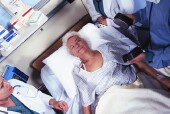Model introduces workforce enhancements for ER staff; linked to reduction in admission to ICUs
FRIDAY, May 8, 2015 (HealthDay News) — The Geriatric Emergency Department Innovations in Care through Workforce, Informatics, and Structural Enhancements (GEDI WISE) model seems feasible for transforming geriatric emergency care, according to a study published in the May issue of Health Affairs.
Corita Grudzen, M.D., from the NYU Langone Medical Center in New York City, and colleagues developed the GEDI WSE model to transform geriatric emergency care by applying principles of palliative care. The model introduced workforce enhancements for emergency department and adjunct staff. Emergency department triage nurses screened patients aged 65 years and older and identified those at elevated risk of emergency department revisit and hospital admission. Once fully trained, nurses screened 94 percent of emergency department visitors who met the screening criteria. High-risk patients suitable for and desiring palliative and hospice care were identified by newly hired emergency department nurse practitioners, and referrals were expedited.
The researchers found that from January 2011 to May 2013 there was a decrease in the percentage of geriatric admissions to intensive care units, from 2.3 to 0.9 percent. This generated more than $3 million in savings to Medicare. Other geriatric care innovations were implemented during the study period and, consequently, this decrease could not be confidently attributed to the GEDI WISE program.
“An initial evaluation of Mount Sinai Medical Center’s GEDI WISE model, implemented in 2012, provides encouraging first glimpses of its feasibility and potential to transform geriatric emergency care,” the authors write.
Copyright © 2015 HealthDay. All rights reserved.








